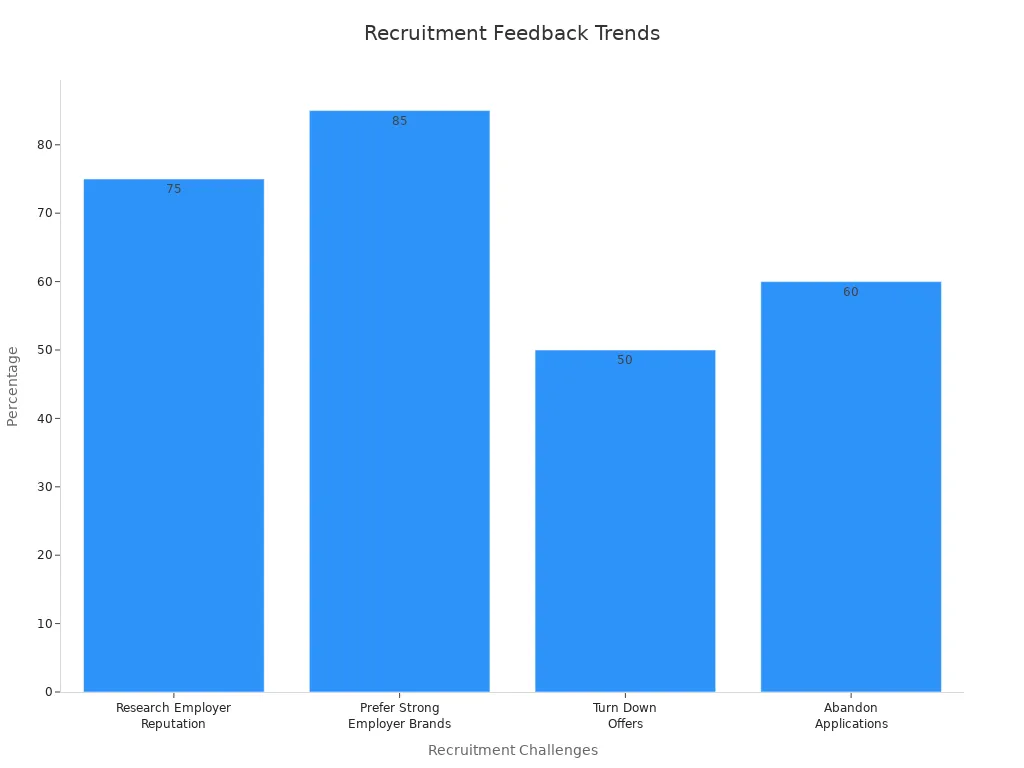How AI Tools Revolutionize Candidate Feedback Automation in Recruitment

Recruitment feedback often feels delayed or impersonal, leaving candidates dissatisfied. AI for candidate feedback automation changes this dynamic by delivering real-time, personalized responses. It uses data-driven insights to craft precise and constructive feedback, enhancing the candidate experience. AI tools also reduce recruiter workloads, enabling them to focus on strategic tasks. With features like sentiment analysis and scalability, AI ensures consistent communication, even during high-volume hiring. These advancements not only improve feedback quality but also strengthen employer branding in competitive markets.
Key Takeaways
AI tools give quick, custom feedback, making candidates happier.
Regular updates from AI make companies seem trustworthy and skilled.
Using AI for feedback saves time for recruiters to connect with people.
Custom feedback from AI helps candidates get better and try again later.
AI uses fair rules for feedback, cutting bias and improving hiring.
The Importance of Candidate Feedback in Recruitment
Enhancing candidate experience through effective feedback
Providing feedback to candidates is more than just a courtesy; it’s a critical part of the recruitment process. When you offer constructive feedback, you show respect for the time and effort candidates invest in applying. This simple act can significantly enhance their experience. For example, a study revealed that 34% of candidates reported not receiving feedback after interviews, highlighting a major communication gap. Addressing this issue by implementing structured feedback routines can improve satisfaction, even for those who don’t get the job.
Feedback also fosters long-term relationships. Candidates who receive actionable insights are more likely to view your company positively. This can lead to future applications or referrals, creating a win-win situation for both parties. Transparency in feedback further ensures that candidates perceive the process as fair, which is essential for maintaining trust.
Strengthening employer branding with consistent communication
Consistent communication during recruitment strengthens your employer brand. Companies like Netflix and Teach for America excel in this area by aligning their messaging with their values. For instance, Netflix uses its careers page and social media to highlight employee stories, reinforcing its brand identity. Similarly, Chipotle showcases employee promotions on Instagram, demonstrating its commitment to growth.
Company | Evidence of Consistent Communication |
|---|---|
Teach for America | Clear and consistent social media presence featuring employee-generated content. |
Netflix | Careers page and social media highlight employee stories and company culture. |
Chipotle | Instagram highlights employee promotions and career progression. |
When you communicate consistently, candidates see your organization as reliable and professional. This perception can attract top talent and set you apart in competitive markets.
Overcoming common feedback challenges in recruitment
Recruiters often face challenges in providing timely and meaningful feedback. Statistics show that 50% of job seekers have turned down offers due to poor candidate experiences, while 60% abandon applications because of lengthy processes. These trends emphasize the need for streamlined feedback systems.

AI for candidate feedback automation offers a solution. By delivering real-time, personalized responses, AI tools address delays and ensure fairness. This technology not only saves time but also helps recruiters focus on building stronger connections with candidates.
AI for Candidate Feedback Automation: How It Works

Real-time feedback delivery through AI tools
AI tools revolutionize feedback delivery by providing real-time responses. These tools analyze large datasets to identify patterns and trends, enabling instant feedback. For example, AI chatbots can deliver immediate post-interview insights, reducing waiting times for candidates. They also support multiple languages, ensuring accessibility for diverse applicants.
Organizations benefit from this agility. AI-powered solutions automate tasks like status updates and candidate screening, which traditionally required manual effort. This automation ensures continuous engagement with candidates, even during high-volume hiring periods.
Task | Traditional Approach | AI-Powered Solution | Impact |
|---|---|---|---|
Feedback Creation | Manual documentation and writing | Faster, consistent responses | |
Candidate Screening | Individual review | Bulk candidate screening | Quicker evaluations |
Status Updates | Manual responses | Automated communications | Continuous engagement with candidates |
By leveraging AI for candidate feedback automation, you can streamline processes and enhance the overall recruitment experience.
Personalization powered by AI-driven insights
AI tools excel at personalizing feedback by analyzing candidate data. For instance, if a candidate is rejected after an interview, AI can generate tailored advice on how they can improve for future opportunities. This level of personalization makes feedback more meaningful and actionable.
AI achieves this by focusing on skills and qualifications rather than subjective opinions. It evaluates performance data to craft feedback that aligns with the candidate's strengths and areas for improvement. This approach ensures fairness and helps candidates feel valued, even if they are not selected.
Sentiment analysis for crafting constructive responses
Sentiment analysis plays a key role in creating constructive feedback. AI tools use sentiment scoring to evaluate the tone of candidate interactions and flag potential issues. For example, they can identify if a candidate feels frustrated or confused and adjust the feedback tone accordingly.
Step | Description |
|---|---|
1 | Implement sentiment scoring tools to analyze candidate feedback. |
2 | Integrate insights into workflows for timely and appropriate responses. |
3 | Train teams to recognize and address sentiment changes effectively. |
This process ensures that feedback is not only constructive but also empathetic. By addressing emotional cues, you can foster stronger connections with candidates and improve their overall experience.
Benefits of AI for Candidate Feedback Automation
Saving time and improving efficiency for recruiters
AI tools significantly reduce the time recruiters spend on repetitive tasks. For example, they can analyze hundreds of resumes in minutes, a process that would take weeks manually. Companies like Hilton have reported a 90% reduction in their time-to-fill ratio after adopting AI. This efficiency allows you to focus on strategic activities, such as building relationships with top candidates.
AI also improves productivity by providing data-driven insights. Organizations using AI-driven solutions have seen a 25% reduction in the average time to fill positions. These tools streamline processes like candidate screening and feedback generation, ensuring faster and more accurate decision-making. By leveraging AI for candidate feedback automation, you can enhance your team's overall efficiency while reducing operational costs.
Elevating the candidate experience with tailored feedback
Personalized feedback transforms the candidate experience. AI tools analyze interview data to provide detailed insights into both technical and interpersonal skills. This ensures that candidates receive actionable advice, helping them improve for future opportunities. A more engaging and personalized recruitment process reflects your company's commitment to innovation and care.
Collecting and delivering tailored feedback also strengthens your employer brand. Candidates appreciate thoughtful responses, even if they are not selected. This approach fosters trust and encourages them to reapply or recommend your organization to others. By using AI for candidate feedback automation, you can create a positive impression that lasts beyond the hiring process.
Ensuring fairness and consistency in feedback processes
AI ensures fairness by basing feedback on objective criteria like skills and qualifications. This reduces the risk of personal bias, which can often influence manual evaluations. For instance, AI tools follow principles like Independence and Sufficiency to maintain consistency across all feedback processes.
Despite these advantages, fairness remains a critical area of focus. A survey revealed that 53.5% of candidates received no feedback after screening, and 69.7% received none after rejection. AI addresses this gap by automating feedback delivery, ensuring every candidate receives timely and constructive responses. This consistency not only enhances fairness but also improves your organization's reputation.
Tip: Regularly monitor your AI tools to ensure they align with ethical standards and deliver unbiased feedback.
Challenges and Solutions in AI-Driven Feedback Automation
Balancing automation with human interaction
AI tools streamline feedback processes, but relying solely on automation can make interactions feel impersonal. Candidates often dislike feeling like they are communicating with a machine. While automation improves efficiency, it can create a sense of detachment. You can address this by integrating human insights into the process. For example, recruiters can review AI-generated feedback to ensure it aligns with the candidate's unique situation.
A successful strategy combines automation with personal engagement. AI can handle repetitive tasks, such as sending status updates, while recruiters focus on building trust and rapport. This balance ensures candidates feel valued and respected throughout the recruitment process.
Tip: Use AI to gather data and tailor communication, but always include a human touch to foster meaningful connections.
Addressing accuracy and avoiding generic feedback
Generic feedback often leaves candidates frustrated and confused. AI tools solve this by providing personalized and actionable insights. They analyze performance data to craft feedback that highlights specific strengths and areas for improvement. This approach ensures relevance and eliminates the inconsistencies often found in manual evaluations.
Evidence Type | Description |
|---|---|
Personalized Feedback | AI delivers tailored advice, making feedback more meaningful than generic responses. |
Consistency | AI removes human bias, ensuring uniform communication across all candidates. |
Analytical Depth | AI-generated feedback often includes deeper critiques compared to surface-level comments. |
To maintain accuracy, train AI tools on diverse datasets. This improves their ability to generate constructive feedback for candidates from various backgrounds. Regularly evaluate the feedback against human reviews to ensure it meets quality standards.
Managing ethical concerns and data privacy issues
AI in recruitment raises ethical questions, particularly around bias and data privacy. Algorithms can unintentionally favor or disadvantage certain groups, leading to discriminatory practices. To prevent this, you should use unbiased datasets and ensure transparency in how AI tools operate.
Data privacy is another critical concern. AI systems often handle sensitive information, such as resumes and interview recordings. Adhering to regulations like GDPR protects candidate data and builds trust. Regular audits and ethical guidelines help mitigate risks, ensuring your recruitment process remains fair and secure.
Note: Avoid storing unnecessary Personally Identifiable Information (PII) to reduce the risk of misuse. Always prioritize ethical practices when implementing AI solutions.
The Future of AI in Candidate Feedback Automation

Emerging trends in AI-powered recruitment tools
AI-powered recruitment tools are evolving rapidly, introducing trends that reshape hiring processes. Predictive hiring is one such trend. It uses analytics to forecast hiring needs, helping you plan better. Enhanced candidate experience is another focus area. AI ensures personalized interactions, making candidates feel valued. Job description optimization is also gaining traction. AI creates inclusive job postings that attract diverse talent. Companies are even leveraging AI to identify internal employees for new roles, promoting growth from within.
Trend | Description |
|---|---|
Predictive Hiring | AI is evolving from automation to predictive analytics, aiding in forecasting hiring needs. |
Enhanced Candidate Experience | AI enhances interactions throughout the hiring process, ensuring a personalized experience. |
Job Description Optimization | AI helps create job postings that attract suitable candidates while promoting inclusivity. |
Internal Mobility | Companies are leveraging AI to identify and upskill internal talent for new roles. |
These trends highlight how AI tools are becoming indispensable in modern recruitment.
AI's role in fostering stronger recruiter-candidate relationships
AI plays a vital role in building stronger connections between recruiters and candidates. Automated follow-ups ensure timely communication, keeping candidates informed at every stage. This consistent engagement makes candidates feel respected and valued. When candidates have a positive experience, they are more likely to trust your organization and maintain a good relationship with recruiters.
AI automates follow-ups, ensuring candidates receive timely communication.
This consistent engagement helps candidates feel valued and respected.
A positive candidate experience contributes to a stronger relationship with recruiters.
By using AI for candidate feedback automation, you can create a recruitment process that prioritizes meaningful interactions.
Predictions for the evolution of feedback automation
The future of feedback automation looks promising. Advancements in natural language processing and predictive analytics will enhance recruitment processes. These technologies will provide personalized and timely feedback, improving candidate engagement. As AI continues to evolve, you can expect tools that offer even deeper insights into candidate performance. This will help you refine your hiring strategies and create a more efficient recruitment system.
AI for candidate feedback automation will likely become more intuitive, adapting to the unique needs of each organization. This adaptability will make it easier for you to deliver high-quality feedback while maintaining fairness and consistency.
Note: Staying updated on AI advancements ensures you remain competitive in the ever-changing recruitment landscape.
AI has transformed candidate feedback automation by making it faster, more personalized, and scalable. You can save time, enhance the candidate experience, and ensure consistent communication with AI tools. However, ethical use remains critical. Regular audits, transparent processes, and proper training help maintain fairness and accuracy in AI-driven decisions. These practices ensure that automation complements human judgment without overshadowing it. As AI evolves, you can expect even smarter tools that foster stronger recruiter-candidate relationships and refine hiring strategies. By embracing these advancements, you position your organization for long-term success in recruitment.
FAQ
1. How does AI ensure fairness in candidate feedback?
AI ensures fairness by analyzing objective data like skills and qualifications. It eliminates human bias, providing consistent feedback to all candidates. Regular monitoring of AI tools helps maintain accuracy and fairness in the recruitment process.
2. Can AI replace human recruiters in providing feedback?
AI supports recruiters by automating repetitive tasks and generating feedback. However, it cannot replace human empathy and judgment. Combining AI with human insights creates a balanced approach that ensures meaningful and personalized communication.
Tip: Use AI for efficiency but always include a human touch to build trust.
3. Is AI feedback automation suitable for small businesses?
Yes, AI tools can benefit small businesses by saving time and improving efficiency. Many AI solutions are scalable and cost-effective, making them accessible for smaller teams. They help streamline processes without requiring significant resources.
4. How can you ensure data privacy when using AI tools?
You can ensure data privacy by adhering to regulations like GDPR. Avoid storing unnecessary personal information and conduct regular audits. Transparent practices build trust and protect sensitive candidate data.
5. What are the limitations of AI in recruitment feedback?
AI may struggle with understanding complex emotions or unique situations. It relies on the quality of data provided. To overcome these limitations, you should combine AI-generated feedback with human review for a more comprehensive approach.
Note: Always train AI tools with diverse datasets to improve their performance.
See Also
Enhancing Candidate Experience With AI Recruitment Tools
Transforming Talent Search Through AI Online Recruitment Systems
Tips For A Smooth Interview Process Using AI Recruiting
Using AI Recruitment Software To Forecast Candidate Success
How AI Recruitment Software Influences Contemporary Hiring Practices
From recruiting candidates to onboarding new team members, MokaHR gives your company everything you need to be great at hiring.
Subscribe for more information

